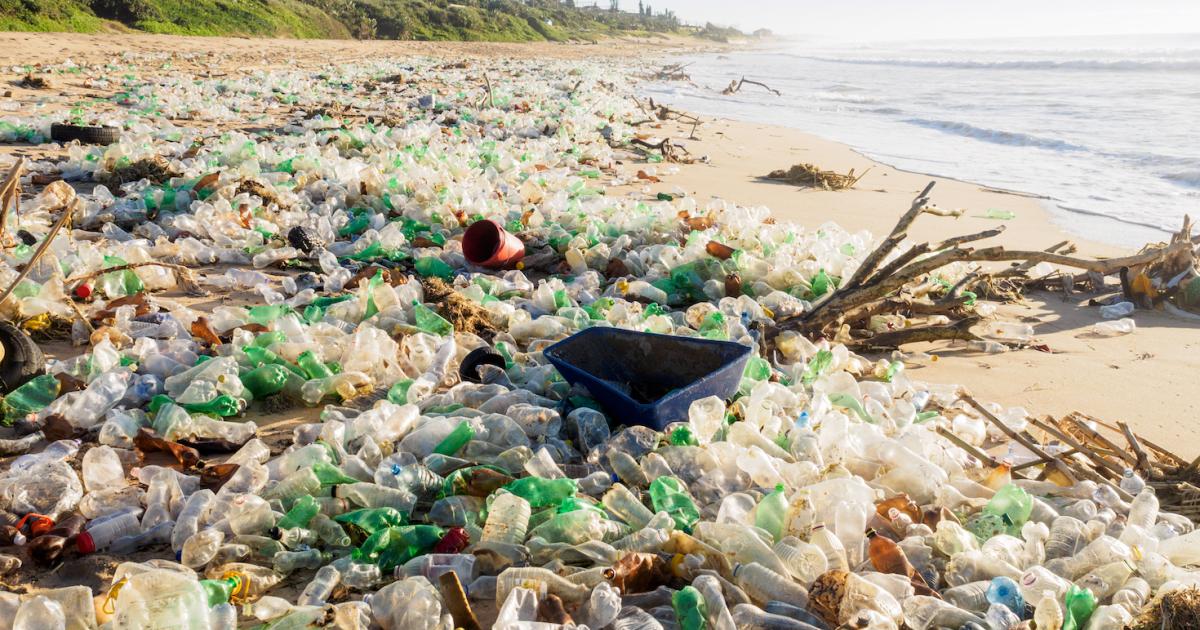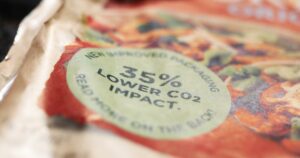
A robust global plastic policy regime could reduce the amount of plastic that is mismanaged annually by 90 percent and result in a 30 percent drop in fossil fuelled plastic production within 17 years, new research has found.
The report, commissioned by the Nordic Council of Ministers for the Environment and Climate and developed by consultancy Systemiq, charts how 15 global policy interventions over the plastic lifecycle could lead to a 30 percent cut in global plastic production against 2019 levels, a seven-fold increase in global recycling output, and a 90 percent reduction in mismanaged plastics volumes by 2040.
The research comes as governments are negotiating the terms of a global plastics treaty to end plastic pollution by 2050 — a legally binding instrument that observers hope will establish common international rules and standards for managing the toxic material.
Without concerted action to tackle plastic pollution, virgin plastic production could jump from 430 million tonnes (Mt) in 2019 to 712 Mt in 2040, with mismanaged plastic volumes that directly pollute the environment set to nearly double, according to Systemiq.
Surging plastic demand is also expected to significantly increase greenhouse gas emissions linked to plastic production and provide oil firms with a business case for continued exploration, even as demand from road transport starts to fall.
Gudlaugur Thór Thórdarson, Icelandic minister of the environment, energy and climate and president of the Nordic Council, said the report highlighted the need for governments to negotiate an ambitious plastic pact.
"An ambitious plastic treaty is a unique opportunity to end plastic pollution by 2040," he said. "This report shows how current global policies, even if upgraded, do not solve plastic pollution entirely. Therefore, we will have to face tough negotiations, spur on more innovation, gather new knowledge and mobilise more ambitious policies to get there. Our future demands a truly circular plastic economy and clean oceans."
Among the recommendations set out in the research are virgin plastic reduction targets, a levy on virgin plastic that would fund solutions across the plastic lifecycle, bans on avoidable single-use plastics, restrictions on the plastic waste trade, mitigation and removal programs for plastics in environment, design rules for safe reuse, repair, durability and cost-effective recycling, and targets for collection and recycling rates.
It also urges governments to introduce upstream and downstream policies that tackle microplastics, the invisible plastic fibers that threaten marine resources and human health.
The report notes that even with the interventions it recommends, roughly 13 million tonnes (Mt) of plastics are expected to remain mismanaged by 2050, of which 5 Mt would be microplastics. Further innovation, research and data is therefore required to deliver solutions that can tackle these residual plastics, the report warns.
The report notes that the policies it recommends would result in a net saving for governments around the world between 2025 and 2040, because it would reduce the need for plastic waste collection and management. But it notes that these savings would be predominately enjoyed in regions with existing recycling and waste management infrastructure, while those lacking infrastructure would need to increase their spending.
As such, debates over funding are set to dominate the upcoming plastic treaty negotiations, with developing nations arguing that they require financial support from industrialized economies to help tackle an environmental crisis they did not cause.
The report also notes that controlled disposal of plastics would still need to continue through 2040 for plastics that cannot be prevented or recycled. And here, too, there is a major disparity between countries with existing recycling infrastructure and developing nations where recycling systems are less sophisticated. If the proposed policies come into force, developed countries would see a 46 percent drop in controlled disposal volumes over the next 17 years, while some developing countries would see an increase of 74 percent as they start to capture waste streams currently lost to landfill or end up polluting the environment.
Systemiq said that if policymakers followed its recommendations, greenhouse gas emissions from plastics would stay roughly the same as 2019 levels, but would amount to 40 percent less relative to the current predictions for 2040.
"Plastic pollution is everywhere," said Espen Barth Eide, Norwegian minister of climate and environment. "Without new and effective control measures, plastic production is set to double in 20 years, and the release of plastics to air, land and water will follow suit. We now have a window of opportunity to develop an effective plastic treaty by the end of 2024. Let's work together to reduce our consumption of plastics and end plastic pollution by 2040 to protect human health and the environment."
It is an encouraging rallying cry, and hopes are relatively high that governments are keen to deliver a new treaty that would advance many policies proposed in the report. There is ample evidence that well managed recycling systems and robust policies can help curb demand fo virgin plastic and create a more circular plastics economy.
But the report also highlights some of the geopolitical tensions and financing challenges that will have to be overcome if a treaty is to be agreed, as well as the urgent need for some pretty drastic innovation fully tackle the plastic industry's outsized environmental footprint.
- SEO Powered Content & PR Distribution. Get Amplified Today.
- PlatoData.Network Vertical Generative Ai. Empower Yourself. Access Here.
- PlatoAiStream. Web3 Intelligence. Knowledge Amplified. Access Here.
- PlatoESG. Carbon, CleanTech, Energy, Environment, Solar, Waste Management. Access Here.
- PlatoHealth. Biotech and Clinical Trials Intelligence. Access Here.
- Source: https://www.greenbiz.com/article/how-global-plastic-policies-could-slash-virgin-plastic-production-30-percent-2040
- :has
- :is
- :not
- :where
- $UP
- 13
- 15%
- 17
- 20
- 20 years
- 2019
- 2024
- 2025
- 2050
- 30
- 40
- 46
- 90
- a
- According
- across
- Action
- advance
- against
- AIR
- also
- ambitious
- amount
- an
- and
- Annually
- ARE
- around
- AS
- Bans
- BE
- because
- between
- binding
- business
- but
- by
- CAN
- cannot
- capture
- case
- Cause
- challenges
- Charts
- Climate
- collection
- come
- comes
- Common
- concerted
- consultancy
- consumption
- continue
- continued
- control
- controlled
- cost-effective
- could
- Council
- countries
- create
- crisis
- Current
- Currently
- Cut
- data
- debates
- deliver
- Demand
- demands
- Design
- develop
- developed
- developing
- Developing Countries
- DID
- directly
- do
- dominate
- double
- Drop
- durability
- economies
- economy
- Effective
- Emissions
- encouraging
- end
- energy
- entirely
- Environment
- environmental
- establish
- Ether (ETH)
- Even
- everywhere
- evidence
- existing
- expected
- exploration
- Face
- Fall
- fibers
- financial
- financing
- firms
- follow
- followed
- Footprint
- For
- Force
- fossil
- found
- from
- fully
- fund
- funding
- further
- future
- GAS
- gather
- geopolitical
- get
- Global
- Governments
- greenhouse gas
- Greenhouse gas emissions
- Have
- he
- Health
- help
- here
- High
- Highlighted
- highlights
- hope
- hopes
- How
- HTTPS
- human
- if
- in
- Increase
- industry
- Infrastructure
- Innovation
- instrument
- International
- interventions
- into
- introduce
- IT
- ITS
- jpg
- jump
- Keen
- knowledge
- lacking
- Land
- lead
- legally
- less
- let
- levels
- levy
- lifecycle
- linked
- lost
- major
- managed
- management
- managing
- many
- Marine
- material
- measures
- million
- ministers
- mitigation
- more
- MT
- Nations
- nearly
- Need
- negotiations
- net
- New
- next
- Norwegian
- Notes
- now
- observers
- oceans
- of
- Oil
- on
- Opportunity
- or
- our
- out
- output
- over
- Overcome
- percent
- plastic
- plastics
- plato
- Plato Data Intelligence
- PlatoData
- policies
- policy
- policymakers
- Pollution
- Predictions
- president
- pretty
- Production
- Programs
- proposed
- protect
- provide
- Rates
- recommendations
- recommends
- recycling
- reduce
- reduction
- regime
- regions
- relative
- relatively
- release
- remain
- removal
- repair
- report
- require
- required
- research
- Resources
- restrictions
- result
- reuse
- road
- robust
- roughly
- rules
- s
- safe
- Said
- same
- saving
- Savings
- see
- set
- Shows
- significantly
- Solutions
- SOLVE
- some
- sophisticated
- Spending
- standards
- start
- starts
- stay
- Still
- streams
- such
- Suit
- support
- Systems
- tackle
- targets
- tensions
- terms
- that
- The
- the world
- their
- There.
- therefore
- These
- they
- this
- those
- threaten
- Through
- to
- together
- too
- tough
- trade
- transport
- truly
- unique
- upcoming
- upgraded
- urgent
- urges
- Virgin
- volumes
- Warns
- Waste
- Water
- we
- WELL
- which
- while
- will
- window
- with
- within
- without
- Work
- work together
- world
- would
- years
- zephyrnet









